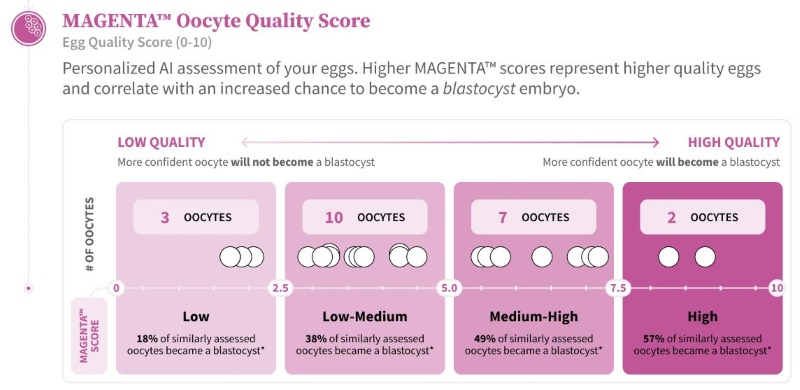If you have polycystic ovary syndrome (PCOS) and are going through IVF, you may be told that you could produce a high number of eggs. At first, this can feel encouraging—more eggs often feels like more chances for success…
But sometimes, even with many eggs collected, the number of blastocysts (day 5-7 embryos) that develop, or the quality of those embryos, may be lower than expected which can feel confusing and frustrating.
Why More Eggs Doesn’t Always Mean Better Outcomes
Standard fertility tests, like AMH (Anti-Müllerian Hormone) or antral follicle count, measure egg quantity, not egg quality. And with PCOS, quality can sometimes be the limiting factor.
That’s where MAGENTA™, an AI-powered egg assessment, adds value. It looks at your eggs individually to give a clearer picture of their potential.
PATIENT EXAMPLE
Let’s look at a real-world type of case:
- Age: 34
- PCOS type: Lean PCOS (irregular cycles, polycystic ovaries, BMI 27)
- History: 2+ years trying to conceive, multiple failed IUI cycles
- Partner History: Semen analysis within normal range
- IVF outcome: 27 eggs retrieved, 22 mature
At first, this sounds amazing—so many eggs! But here’s what MAGENTA™ showed:
- About 59% (13 of 22) of the eggs were low to low-medium quality
- 18 eggs fertilized, but only 5 developed into blastocysts that could be frozen for future use
MAGENTA™ helped explain why the outcome didn’t quite match the initial excitement of a “big egg count.”
THE MAGENTA™ REPORT:

How MAGENTA™ Insights Can Help Patients Like You
💡 Clearer expectations: MAGENTA™ can show you that not every egg will have the same potential, helping avoid surprise or disappointment later.
💡 Better understanding: It reframes the conversation so you know that egg quality matters just as much as egg count.
💡 Personalized planning: Your doctor can use the report to guide next steps—whether that’s adjusting your IVF protocol, optimizing hormones and lifestyle factors, or preparing differently for another cycle.
You Might Also Like …
Join our mailing list for dispatches on the future of fertility

